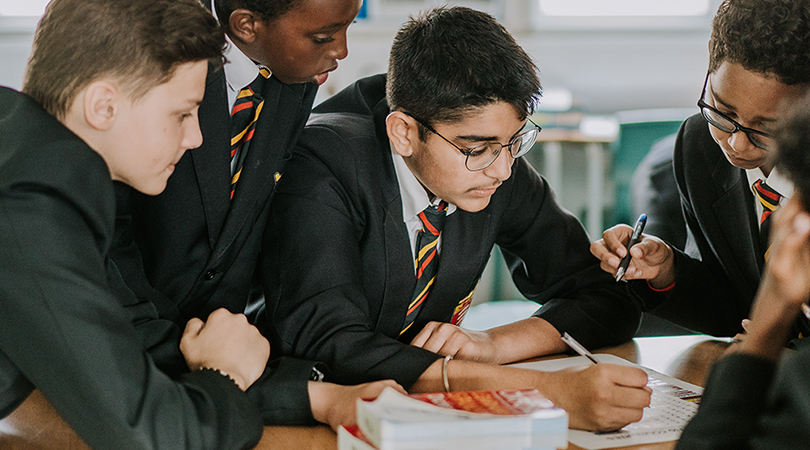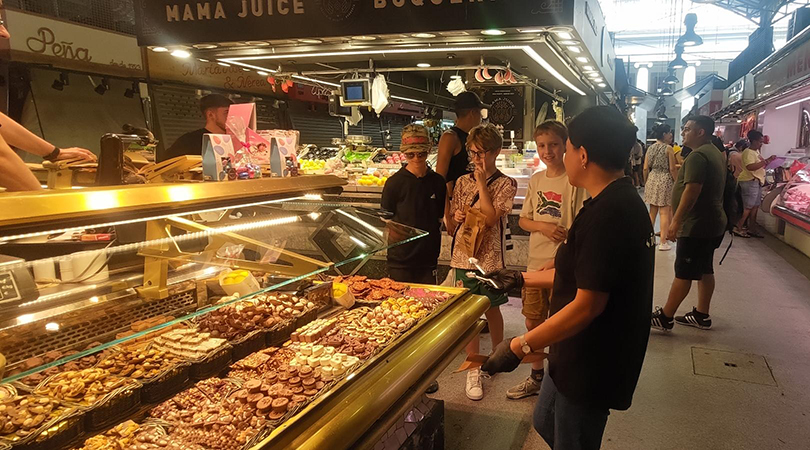All boys at Isleworth & Syon learn either French or Spanish at KS3.
The MFL curriculum is fully differentiated to challenge and support students of all abilities. In Key Stage 3 Spanish, we use the ‘Viva’ textbooks, interactive electronic resources, games and songs to engage students in the language.
Year 7
Curriculum
In Year 7, students study the following topics in Spanish:
- Autumn 1 – My life (Spanish pronunciation, your personality, your family and birthday)
- Autumn 2 – My free time (hobbies, sports, the weather)
- Spring 1 – My school (school subjects, the building, opinions)
- Spring 2 – My family and my friends (physical descriptions, describing where you live)
- Summer 1 – My city (describing your town, telling the time, ordering in a café)
- Summer 2 – Revision for end of year test and cultural studies
Assessment
Each half-term students will complete either a speaking or a listening/reading/writing assessment.
In the speaking assessment students have to read out loud to check their pronunciation, and are asked questions in Spanish by their teacher based on a role-play and a picture card. They should answer in the target language.
In the listening test, students complete exercises after listening to several extracts in the target language. In the reading test, students complete exercises on texts written in the foreign language, including authentic texts. Finally, students produce a piece of writing on the topic and translate short pieces of language into Spanish.
Progress & Preparation Activities (PPA)
Students will be required to complete PPA each week, with each task available to view on the Insight App.
Further Resources

The school has a subscription to The Day, an online news service for schools. Click the button to the right, then browse ‘Subjects’ in the top menu to find Spanish resources.
Please see below for a number of resources to maximise students’ progress during their Year 7 curriculum.
- Duolingo – free app that provides the user with a ‘coach’ who reminds them every day to practise their language skills. Helps with pronunciation, vocabulary and grammar.
- Quizlet – essential for learning core vocabulary.
- Pearson Active Learn – a key resource linked to the course textbooks.
- Pearson ActiveHub – another key resource linked to the course textbooks.
- YouTube – ideal to listen to Spanish music. This is useful to develop listening skills.
- YouTube – search for Extr@. It is a soap made for language learners. There are around twenty episodes, which tell the story of people living in the same building. Really useful for listening skills and vocabulary enrichment.
- Linguascope – ask the teacher for the password! Great tool to revise vocabulary.
- BBC Bitesize Spanish – excellent resources from the BBC.
Year 8
Curriculum
In Year 8 students study the following topics in Spanish:
- Autumn 1 – Describing travel in the past and present (students describe past holidays and their holidays this year).
- Autumn 2 – Describing events in the past, present and future (where you go and what you do in three different tenses)
- Spring 1 – Technology, social events and the environment (how students use technology, their opinions of socialising and environmental issues)
- Spring 2 – What you can, must, will and want to do at school (describing your school life)
- Summer 1 – Family members and where people go and went (describing your family and what they and other people do)
- Summer 2 – Revision for end of year test and cultural studies
Assessment
Each half-term students will complete either a speaking or a listening/reading/writing assessment.
In the speaking assessment students have to read out loud to check their pronunciation, and are asked questions in Spanish by their teacher based on a role-play and a picture card. They should answer in the target language.
In the listening test, students complete exercises after listening to several extracts in the target language. In the reading test, students complete exercises on texts written in the foreign language, including authentic texts. Finally, students produce a piece of writing on the topic and translate short pieces of language into Spanish.
Progress & Preparation Activities (PPA)
Students will be required to complete PPA each week, with each task available to view on the Insight App.
Further Resources

The school has a subscription to The Day, an online news service for schools. Click the button to the right, then browse ‘Subjects’ in the top menu to find Spanish resources.
Please see below for a number of resources to maximise students’ progress during their Year 8 curriculum.
- Duolingo – free app that provides the user with a ‘coach’ who reminds them every day to practise their language skills. Helps with pronunciation, vocabulary and grammar.
- Quizlet – essential for learning core vocabulary.
- Pearson Active Learn – a key resource linked to the course textbooks.
- Pearson ActiveHub – another key resource linked to the course textbooks.
- YouTube – ideal to listen to Spanish music. This is useful to develop listening skills.
- YouTube – search for Extr@. It is a soap made for language learners. There are around twenty episodes, which tell the story of people living in the same building. Really useful for listening skills and vocabulary enrichment.
- Linguascope – ask the teacher for the password! Great tool to revise vocabulary.
- BBC Bitesize Spanish – excellent resources from the BBC.
Year 9
In Year 9, students start studying the topics covered in the GCSE specification. The topics are as follows:
- Autumn 1 Media and technology (students describe life online and other activities they pursue when not online
- Autumn 2 Holidays (students describe their holidays in at least three tenses and revise the formation of present tense verbs)
- Spring 1 Family and home life (students learn how to talk about social media and their relationships with their families)
- Spring 2 Healthy lifestyles (students talk about their physical and mental wellbeing and they changes they will make to improve their lifestyles)
- Summer 1 School (students give their opinions about school and discuss their plans for their studies)
- Summer 2 – Revision for end of year test and cultural studies
Assessment
Each half-term students will complete either a speaking or a listening/reading/writing assessment.
In the speaking assessment students have to read out loud to check their pronunciation, and are asked questions in Spanish by their teacher based on a role-play and a picture card. They should answer in the target language.
In the listening test, students complete exercises after listening to several extracts in the target language. In the reading test, students complete exercises on texts written in the foreign language, including authentic texts. Finally, students produce a piece of writing on the topic and translate short pieces of language into Spanish.
Progress & Preparation Activities (PPA)
Students will be required to complete PPA each week, with each task available to view on the Insight App.
Further Resources

The school has a subscription to The Day, an online news service for schools. Click the button to the right, then browse ‘Subjects’ in the top menu to find Spanish resources.
Please see below for a number of resources to maximise students’ progress during their Year 9 curriculum.
- Duolingo – free app that provides the user with a ‘coach’ who reminds them every day to practise their language skills. Helps with pronunciation, vocabulary and grammar.
- Quizlet – essential for learning core vocabulary.
- Pearson Active Learn – a key resource linked to the course textbooks.
- Pearson ActiveHub – another key resource linked to the course textbooks.
- YouTube – ideal to listen to Spanish music. This is useful to develop listening skills.
- YouTube – search for Extr@. It is a soap made for language learners. There are around twenty episodes, which tell the story of people living in the same building. Really useful for listening skills and vocabulary enrichment.
- Linguascope – ask the teacher for the password! Great tool to revise vocabulary.
- BBC Bitesize Spanish – excellent resources from the BBC.




